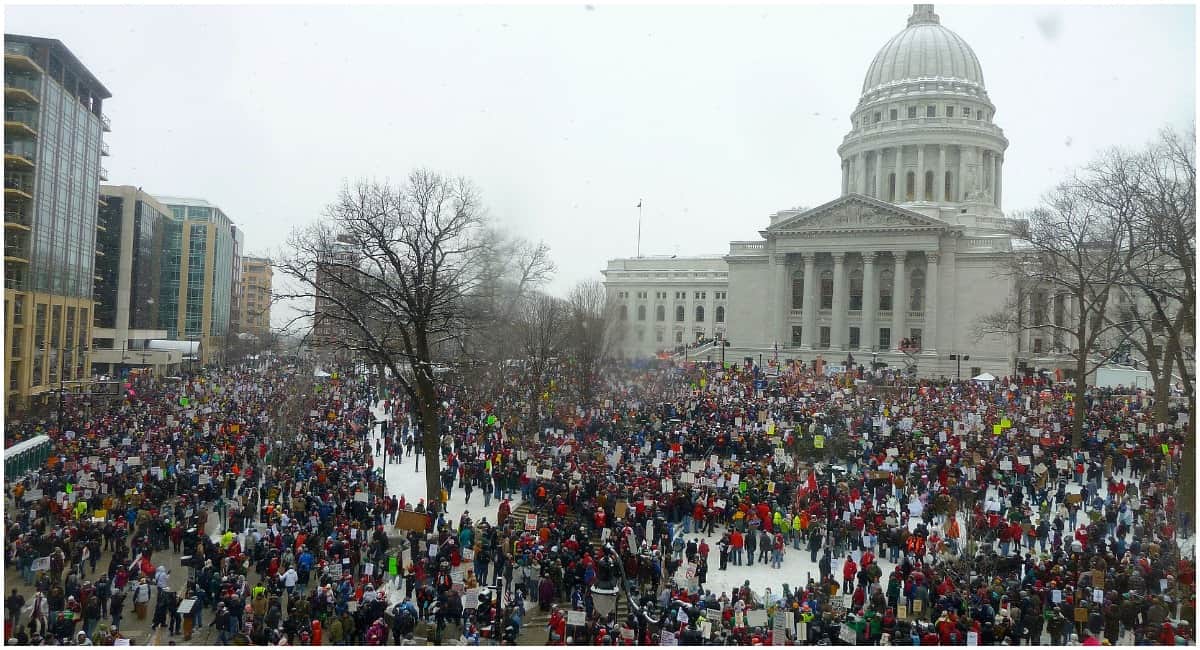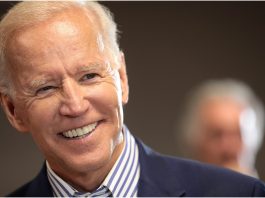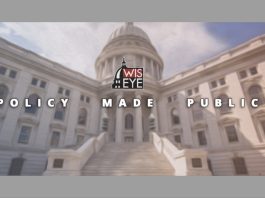“Hey, hey, ho, ho, Scott Walker has got to go!” The catchy little lilt was shouted throughout the Capitol rotunda, and by the union faithful trotting around the Capitol Square with drums, vuvuzelas, and more making a cacophonic din pound at your temples.
The madness from the progressives aimed at Wisconsin’s new Governor, Scott Walker, was over legislation that ultimately became known as Wisconsin’s “Act 10”, and thrust Wisconsin into the national political spotlight in mid-February 2011.
Act 10 and its reforms are needed more than ever today.
Wisconsin was facing a massive $3.6 billion budget shortfall in 2011. Republicans had scored massive victories across the state, taking majorities in both houses of the legislature and the Governor’s office with the rise of the “Tea Party” movement.
Shortly after the legislative session began, sweeping reforms in public employee benefits and collective bargaining privileges were proposed. Democrats and the unions were stunned, and contended Walker was a puppet who hadn’t talked about those reforms during his gubernatorial campaign. Walker said on several occasions Democrats must have been in some sort of “coma.”
Reforms were a part of campaigns, but Democrats under estimated the fortitude of the newly-elected majority. Talk of the reforms just wasn’t the headline grabbing “250,000 jobs” Walker made central to his campaign.
There were three main components of the legislation. For ease of discussion, I’ll refer to public school teachers and the teacher’s unions, the largest group impacted. The legislation involved school districts saving money on health insurance costs, employees contributing to their own retirements, and making contract negotiations more succinct.
My perspective in that time was as a member of the Baraboo School Board, serving on the Finance Committee and Policy & Educational Legislation Committee. I had also been a primary candidate for State Assembly in 2010 in what was then the 42 nd District.
One provision of Act 10 was to break the stranglehold most unions had over a school district’s choice of health insurance providers, forcing districts to choose the union’s WEA Trust. Many unions would only consider allowing districts to save money if those savings translated into salary raises for teachers. The legislation required teachers to pay at least 12.6% of their health insurance premiums. Most paid far less at that time. Unions didn’t want districts to realize actual savings. Participating in the Legislative
Advocacy conferences of the Wisconsin Association of School Boards (WASB) in 2009 and 2010, representatives from hundreds of schools complained about the union chokehold. Legislative liaisons to the conference, now long gone, said it “wasn’t politically time.”
Another component was retirement contributions by enrollees. Union members were going to be asked to pay “their” half of their own retirement contribution, 5.9% of their pre-tax income. Retirement plans in the private sector had evolved to be a cooperative effort between employers and employee. Analysis conducted by the Wisconsin Policy Research Institute (now Badger Institute) in February, 2010 about the “Imbalance Between Public and Private Pensions in Wisconsin” said that in 2010, 88% of employers offered what are commonly known as defined contribution plans, and just 8% offered defined benefit plans, as offered by all government employers. This caused an enormous disparity of financial impact to the state. It’s still on their website today.
The President’s notes at the end of the report were a key source in developing the pension contribution portion of Act 10. They didn’t come out of thin air, or from the behest of the evil Koch brothers. Union leaders who ignored candidates that cited this information did so at their own peril. After the legislation was enacted, union folks would say they would have agreed to benefit changes, but that narrative falls flat. A few districts had received cooperation, but there were ample opportunities to assist districts in dire financial straits over many years where the unions refused to help.
The component that riled the union faithful into a frenzy was potential freedom from union dues and membership options for teachers and staff. Act 10 basically limited contract negotiations between districts and unions to wages. Other components of the work day would be discussed outside the contract. Contract negotiations would often be bogged down for months over the most picayune topics, wasting time and resources. Teachers today complain about the “voice” they have in schools, but it has simply been a shift from an entrenched self-serving union bureaucracy to working directly with peers and administrators. It also increased the threshold needed for the unions to recertify. Unions balked that it was taking away their collective bargaining “rights.” Collective bargaining is not a “right.” It’s a privilege.
Here we are, thirteen years later, Act 10 is still in effect, and saving Wisconsin taxpayers billions of dollars. In March 2023, the non-partisan MacIver Institute projected the cumulative savings to be about $16.8 billion. We’re well on our way to reaching $20 billion. Union negotiations are generally more streamlined, saving both time and resources. There are still myriad issues with public schools, but we achieved a great deal more taxpayer control and input over school funding, thanks to Act 10.
Actual savings varied, but there was a consensus most districts saved around 5% of their annual budgets with Act 10. My district (Baraboo) saved over $1.5 million on a $30 million budget. Those savings, for a district of about 2700 students, are likely about $25 million total since Act 10’s implementation. Since its passage, Act 10 has survived numerous legal challenges and antics, and held constitutional by the Wisconsin Supreme Court in 2014. Democrats introduce legislation every session to repeal Act 10, but thanks to continuing Republican majorities, any action has been thwarted.
Democrats won’t stop their assault on the needed reforms. In the Spring of 2023, Justice Janet Protasiewicz joined the Wisconsin Supreme Court, and showing her lack of judicial ethics, declared Act 10 “unconstitutional.” We’ve already seen the liberal court in action with respect to the new legislative maps. Those new legislative maps, drawn to pit many Republican legislators against one another, bring legislative majorities into play.
Repealing Act 10, whether by legislative action, or the unhinged actions of an activist Supreme Court would be absolutely devastating to the state of Wisconsin. It would be union hubris run amok once again. Chaos would be well beyond the obvious financial impact of at least several billion dollars a year in savings. The MacIver analysis stated the pension contributions alone would top $2 billion a year. It would also reopen the door to countless trifling union complaints.
Union folks will drone on that the only challenge faced by public schools is funding. Any budget surplus Wisconsin now enjoys and rainy day funds would dry up in a matter of nanoseconds. Democrats would be throwing money at the unions like never before.
There needs to be a laser focus on maintaining the Republican legislative majorities. Even when you wince about certain votes they may have cast, we need them on board on this issue. You may be introducing yourself to a new candidate this year with all the map-related chaos, but make sure your legislator or candidate knows the score on Act 10, and their unwavering support is needed.











